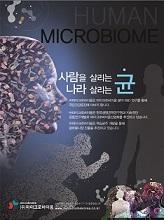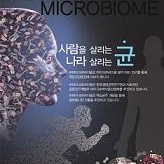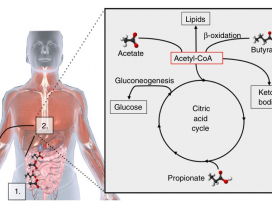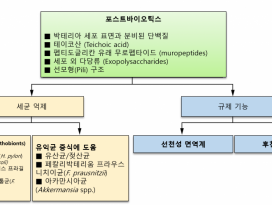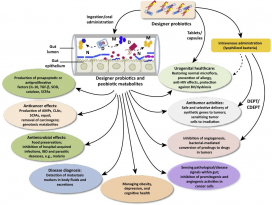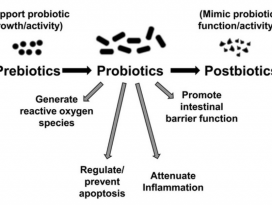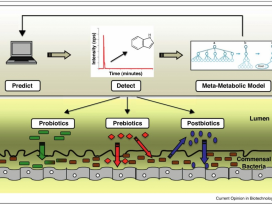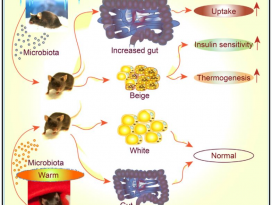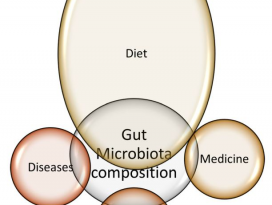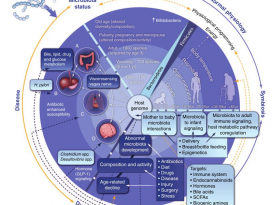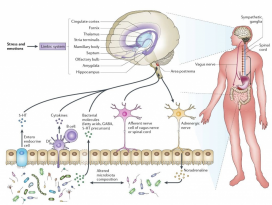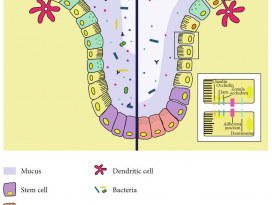Postbiotics: An evolving term within the functional foodsfield
J.E. Aguilar-Toalá,R. Garcia-Varela, H.S. Garcia, V. Mata-Haro, A.F. González-Córdova, B.Vallejo-Cordoba, A. Hernández-Mendoza
| Abstract Background: It has been recognized that a number of mechanisms mediating the health benefits of beneficial bacterial cells do require viability. However, new terms such as paraprobiotic or postbiotic have emerged to denote that non-viable microbial cells, microbial fractions, or cell lysates might also offer physiological benefits to the host by providing additional bioactivity. Scope and approach: This review provides an overview of the postbiotic concept, evidence of their health benefits and possible signaling pathways involved in their protective effects, as well as perspectives for applications in foods and pharmaceuticals. Key findings and conclusions: Postbiotics refers to soluble factors (products or metabolic byproducts), secreted by live bacteria, or released after bacterial lysis, such as enzymes, peptides, teichoic acids, peptidoglycan-derived muropeptides, polysaccharides, cell surface proteins, and organic acids. These postbiotics have drawn attention because of their clear chemical structure, safety dose parameters, long shelf life and the content of various signaling molecules which may have anti-inflammatory, immunomodulatory, anti-obesogenic, antihypertensive, hypocholesterolemic, anti-proliferative, and antioxidant activities. These properties suggest that postbiotics may contribute, to the improvement of host health by improving specific physiological functions, even though the exact mechanisms have not been entirely elucidated. |
제목
포스트바이오틱스 : 기능성 식품 분야 내에서 발전하는 시기
내용
배경: 유익균 세포의 건강상의 이점을 매개하는 다수의 메커니즘이 생존능력을 필요로한다는 것이 알려져 왔다. 그러나 파라프로바이오틱스 (paraprobiotic)또는 포스트바이오틱스 (postbiotic)와 같은 새로운 용어가 생존할 수 없는 미생물세포, 미생물 분획 또는 세포 용해물 (cell lysates)이숙주에게 추가적인 생체 활성을 제공함으로써 생리학적 이점을 제공할 수 있다는 조짐을 보여주기 위해 등장했다.
범위 및 접근법: 본 리뷰는 포스트바이오틱스의 개념에 대한 개요, 건강상의 이익에 대한 증거 및 보호 효과와 관련된 존재 가능한 신호 경로뿐만 아니라 식품 및 의약품에서의 응용분야에 대한 관점을 제공한다.
주요 결과 및 결론: 포스트바이오틱스는 효소, 펩티드, 테이코산 (teichoicacids), 펩티도글리칸 유래 무로펩티드 (peptidoglycan-derived muropeptides),다당류, 세포 표면 단백질 및 유기산과 같이 생균에 의해 분비되거나 세균 용해 후 방출된용해성 인자 (산물 또는 신진대사 부산물)를 뜻한다. 이러한 포스트바이오틱스는 항 염증, 면역 조절, 항 비만요인, 항 고혈압, 저콜레스테롤혈증, 항 증식성 및 항 산화 활성을 가질 수 있는 명확한 화학 구조, 안전한용량 파라미터, 긴 유통 기한 및 다양한 신호 분자 함량 때문에 주목을 끌었다. 이러한 특성은 정확한 메커니즘이 완전히 밝혀지지는 않았지만 포스트바이오틱스가 특정 생리적 기능을 향상시켜 숙주의건강을 개선하는 데 기여할 수 있음을 시사한다.
Keywords
: #BacteriaDerivedFactors #Postbioitcs#Paraprobiotics #Probiotics #Prebiotics #BeneficialBacteria #MetabolicByproducts #Metabolites #Enzymes #Peptides#OrganincAcids #FunctionalFoods #Microbiome #Microorganisms #Microbes #Microbiota#GutMicrobiome #GutMicrobiota #GutMicrobes
#박테리아유래인자 #프로바이오틱스 #유익균 #프리바이오틱스 #포스트바이오틱스 #파라프로바이오틱스 #대사산물 #신진대사산물 #대사부산물 #효소 #펩티드 #유기산 #기능성식품 #마이크로바이옴 #미생물총 #미생물군 #미생물유전자
[출처: Aguilar-Toalá,J. E., Garcia-Varela, R., Garcia, H. S., Mata-Haro, V., González-Córdova, A.F., Vallejo-Cordoba, B., & Hernández-Mendoza, A. (2018). Postbiotics: Anevolving term within the functional foods field. Trends in Food Science &Technology, 75, 105-114.]
|
| ㈜마이크로바이옴 ㈜마이크로바이옴은 생명공학 최고의 기술력을 바탕으로 마이크로바이옴 산업의 성장과 발전의 선도적 역할을 하고 있는 대한민국 대표 마이크로바이옴 R&D 전문 기업입니다. ㈜마이크로바이옴은 생명공학 국가연구기관인 한국생명공학연구원과 마이크로바이옴 관련 상품에 대하여 공동연구개발 및 기술이전을 통하여 공동특허 출원과 마이크로바이옴 상품화에 성공하였고, 마이크로바이옴 글로벌 기업이 되기 위하여 연구개발을 지속하고 있습니다. |
| no. | 제목 | 조회수 |
|---|
㈜마이크로바이옴 ㅣ 서울시 서대문구 연희로 77-12 영화빌딩2층
Tel :02-322-0302 l Fax : 02-322-0759
Copyright (c) Microbiome. Co. All Rights Reserved.
